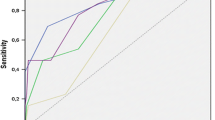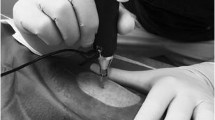Abstract
Osteopenia/osteoporosis affect many elderly people and might not be detected until symptoms of fractures occur. Early detection of osteopenia/osteoporosis is important and would allow preventive measures and treatment. Access to screening for osteopenia/osteoporosis is often limited, whereas panoramic radiography is commonly used in dentistry. The aim of this study was to determine the validity of the Klemetti index (KI), measured on panoramic radiographs, in the diagnosis of osteopenia/osteoporosis as defined by a bone mineral density (BMD) measurement below −1.5 standard deviations (SDs) of a community based sample. In total, 211 consecutive participants (102 men and 109 women) 60–96 years in the SNAC–Blekinge study (Swedish National Study on Ageing and Care) underwent bone densitometry [by dual-energy X-ray absorptiometry (DXA)] of both heels. A panoramic radiograph was taken of each participant, and mandibular cortex on a panoramic radiograph was classified as ‘0’ or normal (even and sharp endosteal margin), ‘1’, moderately eroded (evidence of lacunar resorption or endosteal cortical residues), or ‘2’, severely eroded (unequivocal porosity). From logistic regression, the odds ratio of having a BMD measurement below −1.5 SD was 8.04 (95% CI 2.39 to 27.12, P<0.001) in the ‘osteopenic’ (KI category 2), compared with the ‘normal’ group (KI categories 0 and 1). Receiver operating characteristic (ROC) curve analysis was used to measure the validity of the KI indicating osteopenia (KI category 2) in predicting reduced BMD. This point provided a sensitivity of 50% and a specificity of 89%. Positive and negative predictive values were 21% and 97%, respectively. There were 87% correctly classified subjects. The area under the ROC curve was 0.64. The present study demonstrated that a negative finding (KI category <2) is highly predictive of the absence of osteopenia/osteoporosis as defined by the DXA measurements.


Similar content being viewed by others
References
National Institute of Arthritis (2000) Musculoskeletal and skin diseaseshttp://www.nih.gov/niams/healthinfo/opbkr. htm
Kanis JA, Johnell O, Oden A, Jonsson B, De Laet C, Dawson A (2000) Risk of hip fracture according to the World Health Organization criteria for osteopenia and osteoporosis. Bone 27:585–590
Löfman O, Larsson L, Toss G (2000) Bone mineral density in diagnosis of osteoporosis: reference population, definition of peak bone mass, and measured site determine prevalence. J Clin Densitom 3:177–186
Eddy DM, Johnston CC, Cummings SR, Dawson-Hughes B, Lindsay R, Melton LJ, et al (1998) Osteoporosis: review of the evidence for prevention, diagnosis, and treatment and cost-effectiveness analysis. Status report. Osteoporos Int 4:1–80
Smeets-Goevaers CG, Lesusink GL, Papapoulos SE, Maartens LW, Keyzer JJ, Weerdenburg JP, et al (1998) The prevalence of low bone mineral density in Dutch perimenopausal women: The Eindhoven perimenopausal osteoporosis study. Osteoporos Int 8:404–409
Bollen AM, Taguchi A, Hujoel PP, Hollender LG (2000) Case–control study on self-reported osteoporotic fractures and mandibular cortical bone. Oral Surg Oral Med Oral Pathol Oral Radiol Endod 90:518–524
Kribbs PJ, Smith DE, Chesnut CH 3rd (1983) Oral findings in osteoporosis. Part II: Relationship between residual ridge and alveolar bone resorption and generalized skeletal osteopenia. J Prosthet Dent 50:719–724
Kribbs PJ, Chesnut CH 3rd (1994) Osteoporosis and dental osteopenia in the elderly. Gerodontology 3:101–106
Von Wowern N, Klausen B, Kollerup G (1994) Osteoporosis: a risk factor in periodontal disease. J Periodontol 65:1134–1138
Civitelli R, Pilgram TK, Dotson M, Muckerman J, Lewandowski N, Armamento-Villareal R, et al (2002) Alveolar and postcranial bone density in postmenopausal women receiving hormone/estrogen replacement therapy: a randomized, double-blind, placebo-controlled trial. Arch Intern Med 162:2634–2635
Klemetti E, Vainio P (1993) Effect of bone mineral density in skeleton and mandible on extraction of teeth and clinical alveolar height. J Prosthet Dent 70:21–25
Klemetti E, Collin HL, Forss H, Markkanen H, Lassila V (1994) Mineral status of skeleton and advanced periodontal disease. J Clin Periodontol 21:184–188
Taguchi A, Sanada M, Krall E, Nakamoto T, Ohtsuka M, Suei Y, Tanimoto K, Kodama I, Tsuda M, Ohama K (2003) Relationship between dental panoramic radiographic findings and biochemical markers of bone turnover. J Bone Miner Res 18:1689–1694
Ekman A, Michaelsson K, Petren-Mallmin M, Ljunghall S, Mallmin H (2001) DXA of the hip and heel ultrasound but not densitometry of the fingers can discriminate female hip fracture patients from controls: a comparison between four different methods. Osteoporos Int 12:185–191
Kirk JK, Nichols M, Spangler JG (2002) Use of a peripheral dexa measurement for osteoporosis screening Fam Med 34:201–205
Picard D, Brown JP, Rosenthall L, Couturier M, Levesque J, Dumont M, Ste-Marie LG, Tenenhouse A, Dodin S (2004) Ability of peripheral DXA measurement to diagnose osteoporosis as assessed by central DXA measurement. J Clin Densitom 7:111–118
Hudelmaier M, Kuhn V, Lochmuller EM, Well H, Priemel M, Link TM, Eckstein F (2004) Can geometry-based parameters from pQCT and material parameters from quantitative ultrasound (QUS) improve the prediction of radial bone strength over that by bone mass (DXA)? Osteoporos Int 15:375–381
Nakamoto T, Taguchi A, Ohtsuka M, Suei Y, Fujita M, Tanimoto K, Tsuda M, Sanada M, Ohama K, Takahashi J, Rohlin M (2003) Dental panoramic radiograph as a tool to detect postmenopausal women with low bone mineral density: untrained general dental practitioners’ diagnostic performance. Osteoporos Int 14:659–664
Wactawski-Wende J (2001) Periodontal diseases and osteoporosis: association and mechanisms Ann Periodontol 6:197–208
Chesnut CH 3rd (2001) The relationship between skeletal and oral bone mineral density: an overview Ann Periodontol 6:193–196
Payne JB, Reinhardt RA, Nummikoski PV, Patil KD (1999) Longitudinal alveolar bone loss in postmenopausal osteoporotic/osteopenic women. Osteoporos Int 10:34–40
Tezal M, Wactawski-Wende J, Grossi SG, Ho AW, Dunford R, Genco RJ (2000) The relationship between bone mineral density and periodontitis in postmenopausal women. J Periodontol 71:1492–1498
Inagaki K, Kurosu Y, Kamiya T, Kondo F, Yoshinari N, Noguchi T, Krall EA, Garcia RI (2001) Low metacarpal bone density, tooth loss, and periodontal disease in Japanese women. J Dent Res 80:1818–1822
Persson RE, Hollender LG, Powell LV, MacEntee MI, Wyatt CC, Kiyak HA, Persson GR, et al (2002) Assessment of periodontal conditions and systemic disease in older subjects: Focus on osteoporosis. J Clin Periodontol 29:796–802
Mager DL, Ximenez-Fyvie LA, Haffajee AD, Socransky SS (2003) Distribution of selected bacterial species on intraoral surfaces. J Clin Periodontol 30:644–654
Page RC, Offenbacher S, Schroeder HE, Seymour GJ, Kornman KS (1997) Advances in the pathogenesis of periodontitis: summary of developments, clinical implications and future directions. Periodontol 14:216–248
Sun JL, Meng HX, Cao CF, Tachi Y, Shinohara M, Ueda M, Imai H, Ohura K (2002) Relationship between vitamin D receptor gene polymorphism and periodontitis. J Periodontal Res 37:263–267
Chevalley T, Rizzoli R, Nydegger V, Slosman D, Rapin CH, Michel JP, et al (1994) Effects of calcium supplements on femoral bone mineral density and vertebral fracture rate in vitamin D–replete elderly patients. Osteoporos Int 4:245–252
Dawson-Hughes B, Harris SS, Krall EA, Dallal GE (1997) Effect of calcium and vitamin D supplementation on bone density in men and women 65 years of age or older. N Engl J Med 337:670–676
Persson RE, Persson GR, Kiyak HA, Powell LV (1998) Oral health and medical status in dentate low-income older persons. Spec Care Dent 18:70–77
Acknowledgements
We thank Dr. R.E. Persson for help in validating the radiographic measurements. We are grateful to the staff and participants of SNAC–Blekinge for their help and interest in the study. We also thank the Swedish Ministry of Health and Social Affairs, Blekinge Institute of Technology, Kristianstad University, Blekinge County Council and Blekinge Institute for Research and Development for funding this study.
Author information
Authors and Affiliations
Corresponding author
Rights and permissions
About this article
Cite this article
Halling, A., Persson, G.R., Berglund, J. et al. Comparison between the Klemetti index and heel DXA BMD measurements in the diagnosis of reduced skeletal bone mineral density in the elderly. Osteoporos Int 16, 999–1003 (2005). https://doi.org/10.1007/s00198-004-1796-x
Received:
Accepted:
Published:
Issue Date:
DOI: https://doi.org/10.1007/s00198-004-1796-x




